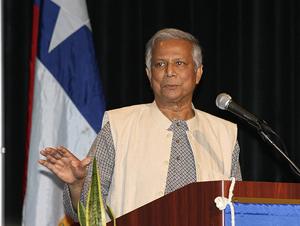Helping the poorest of the poor via “social business”
Muhammad Yunus addresses the crowd at the Houston World Affair’s Council in 2008. (CC: eschipul/Flickr)
The following is not a full transcript; for full story, listen to audio.
Muhammad Yunus founded the Grameen Bank which pioneered the practice of micro-lending as a way for poor people to start their own businesses. Yunus won the Nobel Peace Prize in 2006.
Grameen Bank specializes in very small loans, often under $100 U.S., which they can use to start businesses and lift their families out of poverty. Now, Yunus wants to go beyond micro-credit by engaging in what he calls "social business" to help what he calls the poorest of the poor.
"We focused on beggars recently, about four years back, because people were telling us that micro-credit is a good idea, but it only works for the entrepreneurial poor. I always said that all human beings are entrepreneurs by the definition of a human being. A human being is an entrepreneurial being; that is how we survive on this planet, flourished on this planet.
Yunus detailed the program focused on beggars, and showed some staggering results. After counseling the beggars, they suggested that they offer some small toys or candies to offer in exchange for the charities to those that they approach, rather than simply asking for money. "People liked that. Now, we have over 100,000 beggars in that program. About 10,000 of them have already stopped begging because they became successful door-to-door salespersons."
The loans in Yunus’ program have no interest and no time limit, therefore there are no defaults. Yunus acknowledges that this is a very different way of doing business than people are accustomed. The metric of success for the program is dependent less upon the bottom line. Rather, it looks to the effect it is having upon its borrowers.
First, Yunus points again to the number of people, about one-tenth of the total, that have stopped begging altogether. He also points to the number of repeat borrowing customers. When a borrower pays back the first loan, they are then ready to take another loan.
"The loan size is about $15 U.S., that is about it. Grameen Bank could have given them $15 as a kind of charity to all of them, but probably that would not have changed anything for them because that has not created a process, a system by which they can continue," explains Yunus.
"To the Best of Our Knowledge" is an audio magazine of ideas – two hours of smart, entertaining radio for people with curious minds. More "To the Best of Our Knowledge"
